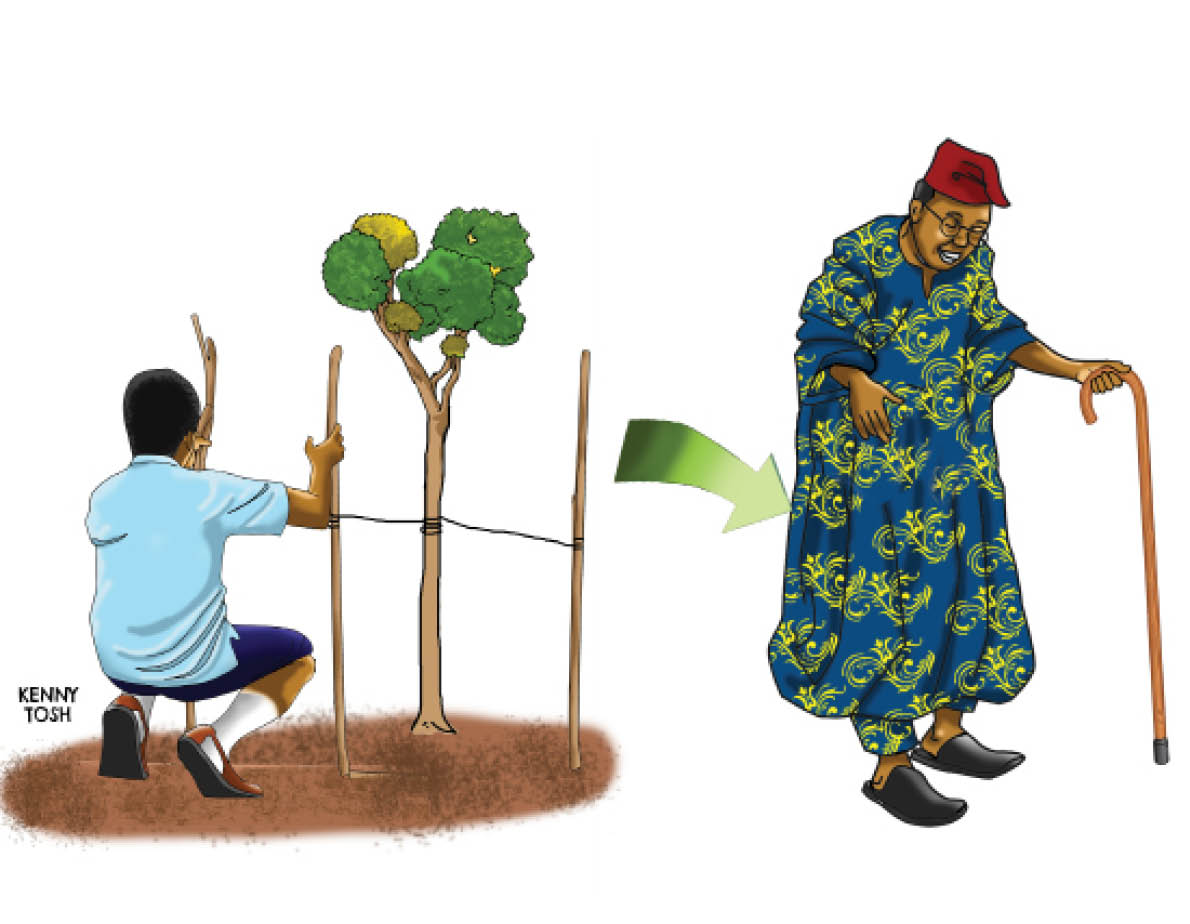Recently, a dear friend shared a poignant meme with me. It depicted a young boy tenderly giving a stick as a stake to a tiny seedling, offering it much-needed support as it strived to grow. Fast forward several years, and the scene shifts: the boy, now a frail old man, receives a stick from the fully-grown tree, to be used as a cane to support his weakened frame.
The meme encapsulates a profound life lesson that stretches far beyond the pixels on a screen—it serves as an apt metaphor for the concept of legacy. The idea it conveys is simple yet impactful: a legacy should be considered as a long-term investment, one that may yield rewards either in this life or the next. It’s a timely reminder that while the fruits of our labour might not be immediately evident, they can echo through time, providing tangible or intangible benefits to ourselves and others.
The notion of leaving a legacy is deeply embedded in the human psyche. From ancient civilizations building monumental pyramids to modern-day philanthropists establishing educational foundations, humans have always been motivated by the desire to make a lasting impact. Yet, the impulse to create a legacy should not be driven by the expectation of immediate gains. There’s a growing perspective that one shouldn’t even expect any material rewards within this lifetime for their good deeds. And I find myself agreeing with this viewpoint.
Take tree planting as an illustrative example. The act is highly symbolic and also literally beneficial to future generations. Older individuals are encouraged to partake in this activity, fully knowing that they won’t be around to enjoy the shade or fruits of the trees they plant. The act itself becomes a testament to their forward-thinking and altruistic nature.
Insecurity: Over 23,000 Nigerians still missing – FG
FG shuts Lagos airport old terminal Oct. 1, suspends Nigeria Air
The sentiment is beautifully captured in a popular movie, where a female character offers wisdom to her friend. She states, “A society becomes great when old men plant trees whose shade they know they will never sit in. Good people do things for other people. That’s it. The end.” This line encapsulates the essence of building a strong, thriving community.
Surprisingly, when we adopt an other-focused disposition, scientific studies have shown that we stand to gain more than just moral satisfaction. Research indicates that altruistic behaviours can significantly boost our levels of happiness and may even lead to increased wealth. One example of such a study was conducted by Arthur Brooks who found that charitable giving leads to an increase wealth of the giver.
On the topic of happiness, numerous psychological studies confirm that acts of kindness release endorphins, which are natural mood lifters. As for wealth, one might argue that a reputation for goodwill and community involvement can open doors to new opportunities, be they in business, friendships, or partnerships, thereby indirectly contributing to one’s financial well-being.
However, it’s essential to address some counter-arguments. Skeptics might say that the idea of leaving a legacy is overrated, or that the focus on altruistic acts as a pathway to happiness and wealth is overly idealistic. They argue that life’s complexities often prevent such straightforward outcomes.
While these criticisms hold some validity, the overwhelming body of evidence supports the benefits of altruistic actions. Even if the path from good deeds to happiness and wealth isn’t a straight line, the overall trajectory tends to be positive.
Another way to conceptualize the impact of legacy is through the Butterfly Effect, a term often used in chaos theory. This principle suggests that a small action, like the flap of a butterfly’s wings in Brazil, can set off a tornado in Texas. While this is a theoretical construct, it emphasizes the far-reaching consequences of even the smallest deeds. When we think about legacy, our seemingly inconsequential acts could snowball into something much greater over time.
From a scientific standpoint, neuroscience has shown that altruistic behaviors have a tangible impact on brain activity. For example, performing acts of kindness activates the same ‘reward centres’ in the brain that are stimulated by pleasurable activities like eating. This phenomenon is commonly referred to as the ‘helper’s high,’ a psychological state that boosts our mood and provides a sense of fulfillment. Essentially, the brain is hardwired to feel good when we do good.
Advancements in social network theory also shed light on the ripple effects of altruistic behaviour. Scientists have found that kindness spreads through social networks up to three degrees of separation. This means when you do something good for someone, that person is more likely to perform a kind act for someone else, who in turn passes it on, thereby amplifying the impact of a single good deed.
The notion of ‘paying it forward’ is another compelling example that illustrates the cyclical nature of good deeds and the establishment of a lasting legacy. It encourages the beneficiary of a good deed to not pay it back to the benefactor, but rather extend a new act of kindness to a third person, who then continues the cycle. This chain of altruism can touch countless lives, weaving a tapestry of goodwill that extends far beyond the original act.
While tangible legacies like monuments or financial endowments are more easily recognized, intangible legacies—like the values, ethics, or wisdom passed down through generations—should not be underestimated. These are the invisible threads that hold the fabric of society together, creating a lasting impact that often defies quantification.
To circle back to the meme that started this discourse, the interaction between the boy and the tree transcends its literal representation. It serves as a mirror to our actions and their long-term consequences. The act of giving and receiving comes full circle, echoing the symbiotic nature of legacies. By investing in positive actions today, we’re essentially sowing seeds for a better tomorrow, not just for ourselves but for the world at large.
In conclusion, the idea of legacy is multi-faceted, underpinned by scientific, social, and philosophical elements. By adopting a long-term perspective, each one of us has the power to contribute meaningfully to society and perhaps even change the course of history, just as the boy in the meme changed his future through a simple act of kindness.




